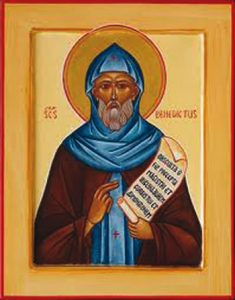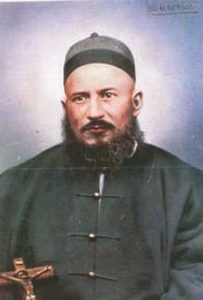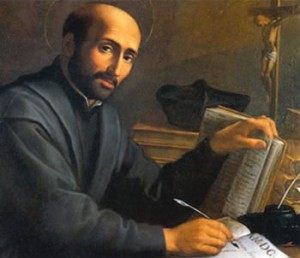July Saints
 Saint Benedict (c480-547)
Saint Benedict (c480-547)
Saint Benedict was born around the year 480 in the district of Nursia, central Italy. As a young man he was sent to Rome for studies but left after a short stay, desiring to dedicate his life to God. At Subiaco, Benedict lived a life of solitude and prayer, supported by a monk, Romanus. His time as a hermit was interrupted for a short period when he became the superior of a group of unruly monks. Ultimately unhappy with his guidance, they tried to poison him. He then withdrew to the cave at Subiaco once again.
Eventually, Benedict’s sanctity attracted disciples and, in time, twelve small monasteries were established around Subiaco, with Benedict as the spiritual father of them all.
Around the year 530 Benedict left Subiaco with some of his disciples for Monte Cassino, where he began a single, close-knit community on a mountain top. There he completed his ‘rule for Monks’ and remained until his death around the year 547.
Saint Benedict, teach us to become holy in our ordinary lives.
(Source: http://Christdesert.org/The_Porter/Daily_Life/Who_is_St_Benedict/index.html)
 Saint Alberic Crescitelli (1863-1900)
Saint Alberic Crescitelli (1863-1900)
Saint Alberic Crescitelli was born in Altavilla, Italy, in 1863, one of ten boys. Because he was the strongest and brightest, his father destined him to oversee work in the fields. Alberic, however, wanted to become a priest and go to the foreign missions. Rejected by the army for health reasons, he finally confided to his mother his deepest desire.
In 1880, he entered the Pontifical Institute of Sts Peter and Paul Seminary and immersed himself in his studies. Three years later, he returned home to bury his father and his sister who had died in an earthquake. While there, he helped nurse cholera victims in his home village, despite the risk of infection.
Ordained in 1887, he left the following year for China. He arrived at a time of chaos and civil unrest when all things foreign, including people, were shunned and hated. The Boxers were ordered by the empress to destroy all foreigners on national land, Chinese Christians, and the merchants who dealt with foreigners. Missionaries were included. But Alberic had listened to the voice of the Lord, and wrote, “My heart tells me that I am where I belong, where God wants me, and I am happy.”
The Chinese were not receptive to Catholicism but despite their indifference or even hostility, Alberic continued to catechise, give aid, teach agriculture and buy land for the poor. As the unrest escalated, Alberic’s catechumens warned him that there was a plot to murder him, but he resisted until he realised that his presence might cause even more violence so he decided to place himself under the authority of a friendly mandarin. However, he was offered refuge in the customs house by a scheming customs official.
Later in the evening, three mortar rounds were fired, a signal, and a mass of people gathered at the door. The official, pretending sorrow, said to him, “You see how many people are gathered against you. It’s impossible for me to defend you. The only means of escape, if you can make it, is the back door, which faces the mountain.” Realising escape was impossible, Alberic knelt to pray. The crowd beat him, then carried him to the marketplace where he endured hours of torture. In between the states of delirium that overcame him, he still prayed for his attackers. A friendly mandarin tried to rescue him, but the Boxers dragged him to the river and hacked him to pieces. He was just 37 years of age.
Alberic Crescitelli is the Pontifical Institute for Foreign Missions’ first, and so far only, saint.
Saint Alberic, help us to stand firm for the faith in the face of ridicule and persecution.
(Source: Internet – various)
 Saint Ignatius Loyola (1491-1556)
Saint Ignatius Loyola (1491-1556)
Ignatius was born in 1491, a nobleman of Spain, and was bred to arms. After being wounded in battle against the French, he heard the call of God and, after pilgrimage to the Holy Land, studied for the priesthood. The lessons he had learned as a soldier he employed in the service of the Church and in 1534 he began the foundation of the Society of Jesus, spiritual soldiers whose characteristic virtue was obedience to the needs of the Church for the greater glory of God.
To foster spiritual development among the faithful, Ignatius devised his famous Spiritual Exercises, still in use today. From 1541, he directed his society from Rome, where he died in 1556.
Saint Ignatius, help us become true soldiers of Jesus Christ.
(Source: A new dictionary of saints. Comp. by Donald Attwater. Burns & Oates, Kent 1993)
 Entries(RSS)
Entries(RSS)